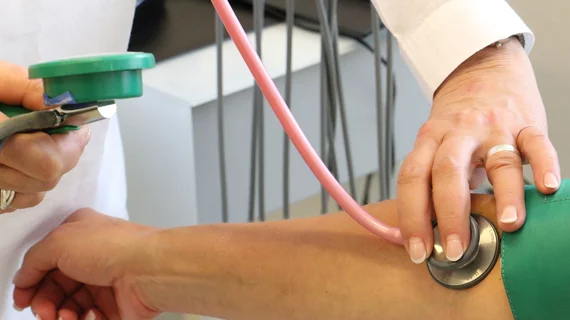Older patients benefit from aggressive blood pressure management
Intensive blood pressure treatment in older patients with hypertension reduces the incidence of cardiovascular events, according to new research presented virtually at ESC Congress 2021 and published in the New England Journal of Medicine.
The authors found that previous blood pressure-lowering trials in older adults with hypertension had mixed results.
Data from the STEP study was used to gather new evidence on the benefits of lowering the blood pressure of older patients with hypertension. It examined whether intensive treatment that targeted a systolic blood pressure (SBP) below 130 mmHg could lower the risk of cardiovascular disease compared with aiming for a SBP below 150 mmHg.
The authors focused on data from 8,511 hypertensive patients between the ages of 60 and 80 years old. All patients had a SBP between 140 and 190 mmHg, and they were all actively taking antihypertensive medications. Patients who had a stroke were excluded from the study.
The study’s primary outcome was a composite of acute coronary syndrome (ACS), stroke, acute decompensated heart failure, coronary revascularization, atrial fibrillation (AFib) or death from cardiovascular causes. Secondary outcomes included the components of the primary endpoint, major artery stiffness, and a decline in renal function or development of end-stage renal disease.
According to the authors, a major strength of the trial was that home blood pressure readings were monitored as an adjunct to office measurements via a smartphone-based application. Also, a monthly report on the home measurements was sent to doctors, a strategy designed to improve the efficiency of blood pressure control during the trial.
At one year of follow-up, the mean systolic blood pressure was 127.5 mm Hg in the intensive-treatment group and 135.3 mm Hg in the standard-treatment group.
During a median follow-up period of 3.34 years, primary-outcome events where seen in 147 patients in the intensive-treatment group compared with 196 patients in the standard-treatment group.
With respect to secondary outcomes, intensive treatment was associated with a 34% lower relative risk of stroke and a 32% lower relative risk of acute coronary syndrome.
The team also found that the progression of arterial stiffness evaluated by brachial-ankle pulse wave velocity was substantially slower in the intensive treatment group.
The researchers determined that the rates of serious adverse events and renal outcomes did not differ between the two groups except for the incidence of hypotension, which was higher in the intensive-treatment group 146 patients, versus 113 patients in the standard treatment group.
“Active control of SBP to below 130 mmHg in older hypertensive patients, as compared with below 150 mmHg, resulted in a lower incidence of major cardiovascular events, with no increase in renal injuries," principal investigator Jun Cai of the Chinese Academy of Medical Sciences in China, said in a press release. “Home blood pressure monitoring more accurately reflected long-term fluctuations in blood pressure than office measurements.”
More information related to ESC Congress 2021, a virtual conference hosted by the European Society of Cardiology, is available here.
